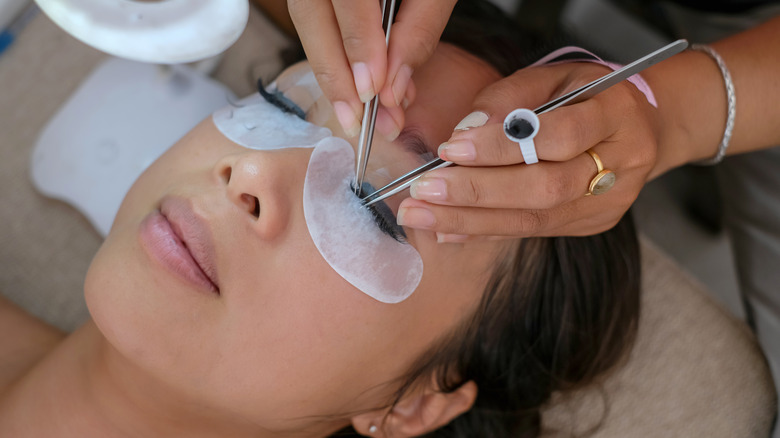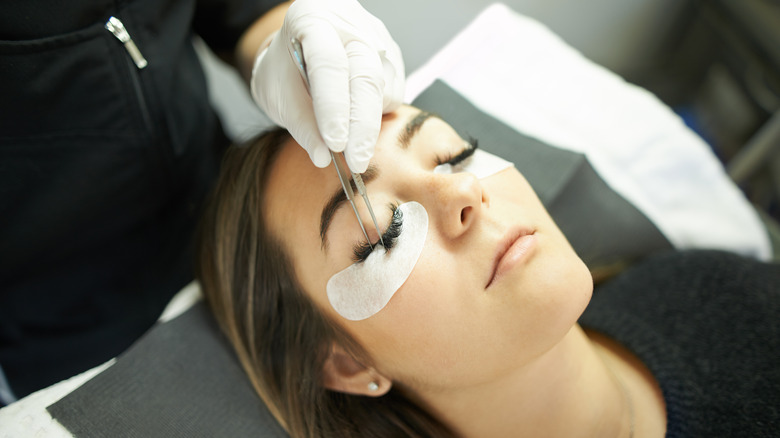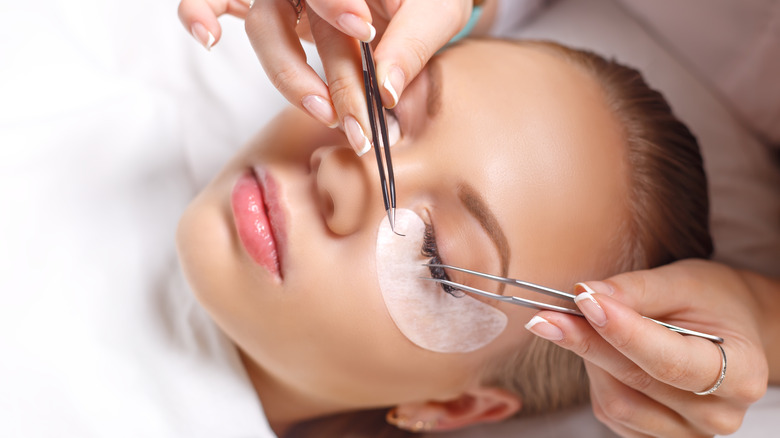Before You Get Lash Extensions You Should Probably Know The Risks
We may receive a commission on purchases made from links.
Eyelash extensions are quickly becoming a routine treatment in beauty routines for many of us. It's no wonder why they're so popular. They're semi-permanent and last for around 2 months, giving your natural lashes a fuss-free boost. Your makeup routine is suddenly way easier, since you don't have to fuss with mascara and eyelash curling, and your makeup removal at the end of the night is a cinch too. There's no hassle with waterproof makeup remover or the need to rub your eyes to get rid of eye makeup. And if less makeup in the summer is your preference, lash extensions are a great way to keep things easy. There's certainly a lot going for the treatment.
But there's more to know about lash extensions than you might guess. For starters, a lash technician needs a license to work on your lashes. The standard procedure for lash extensions is that your technician glues a false lash to each of your existing lashes. The exception to this is known as the Russian Volume, where more than one false lash is added to your existing lash. It's worth knowing the risks involved before you get a set. They're expensive and time-consuming, so you don't want to make a flippant decision about them. Then there's the risk of damage to your lashes and even infection (in some cases). If you're considering this treatment, here's everything you need to know.
Lash extensions can damage your lashes
Lash extensions can damage your lashes in some cases. Your natural lash needs to be able to support the weight of the false lash. So if you opt for lash extensions that are too big they can strain your natural lashes. Your natural lashes can fall out because of this, and the hair follicle itself can become permanently damaged. "Repeated damage to your follicles could eventually slow or even stop production of your natural lashes," Dr. Jennifer Yu told UW Medicine. However, this tends to happen with inexperienced lash technicians, who choose lashes that are too big for their client's natural lashes. There's also the risk of lash glue getting in places where it's not meant to go.
If lash extensions are done by an experienced and talented lash technician, your natural lashes can actually improve over time. This is because you don't have to use a lash curler every day or rub down lashes in an effort to get mascara off. "The key to a great, non-damaging, and sustainable set is to find an artist who is isolating each natural lash to keep the growth cycle intact and choosing lashes with appropriate lengths," Courtney Buhler of Sugarlash Pro told The Cut. This way, the lashes don't become strained by excessively large extensions. Plus, a trained technician would never allow the lash glue to come in contact with your skin, so there's no risk of allergic reactions from that.
The risk of infection from lash extensions
There's also the possibility of getting an eye infection from lash extensions. "Just about every ophthalmologist has seen someone with a reaction or complication from eyelash extensions," Yu explained. This typically happens because people don't cleanse their eyes properly in an effort to care for their new lashes. For example, you may be advised to avoid oil-based cleansers, so people might not wash their faces as often while they adjust to their new routine. "In an effort to protect them, you can end up not doing the natural cleansing that you would normally do," Yu said. This can lead to a buildup of bacteria. If the hair follicles become blocked, it can cause a stye.
However, there are ways to avoid this. Be sure to speak with your lash technician about the appropriate cleansers to use so that you can both care for your lashes and clean your eyes — particularly your eyelids. You & Eye By Dr. Nicky Keep It Fresh Foaming Cleanser is a great cleaner that's approved for lash extensions.
While you can mitigate infections, there is also the inevitable risk of lashes falling into your eye — which happens all the time with natural lashes. With a false lash glued to each natural one, it's possible that these will fall into your eye (glue and all) and cause irritation. Typically, you can remove this easily, but sometimes stray eyelashes can get caught. If any problems persist, see an ophthalmologist.


